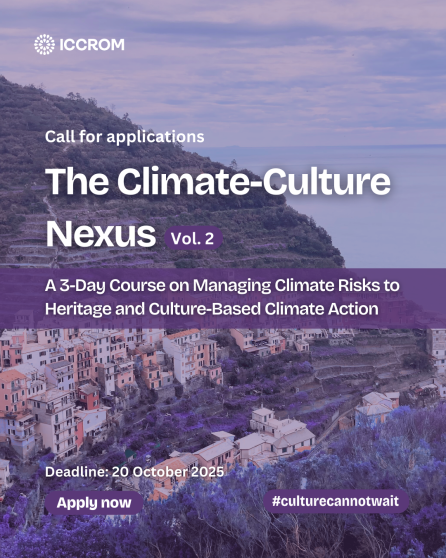A 3-Day International Course on Managing Climate Risks to Heritage and Culture-Based Climate Action
Building on the success of ICCROM’s pioneering course on climate risk assessment for heritage and heritage-based climate action—developed under the flagship First Aid and Resilience for Cultural Heritage in Times of Crisis (FAR) programme—this second edition opens the door to deeper learning and collaboration.
Participants will gain access to a field-tested methodology that supports them in assessing climate risks to both tangible and intangible heritage, drawing on Indigenous and local knowledge to create context-specific mitigation and adaptation strategies, and advancing community-based disaster risk reduction together with civil protection agencies, municipalities, and local communities.
We are inviting 30 committed professionals from diverse backgrounds who are eager to safeguard heritage from the impacts of climate change and to bridge the gap between science and community. Embracing a citizen science approach, the course empowers participants to co-create knowledge, harness local observations, and translate evidence into effective culture-based climate action. Guided by practical tools, real case studies, and hands-on exercises, you will develop skills directly applicable to your own professional and community contexts.
Why this Course?
Since our first edition, Europe has endured its worst wildfire season on record, with more than one million hectares burned. Beyond the loss of forests and homes, these fires have scarred archaeological landscapes, sacred places, and heritage towns, leaving behind irreparable damage. Scientists warn that wildfires like those that devastated Türkiye, Greece, and Cyprus are now far more likely in today’s warmer climate, placing heritage directly on the frontline.
At the same time, rising seas are accelerating, swallowing coastlines, flooding historic urban areas, eroding fortifications, and salting soils that sustain traditional farming and foodways. These are not future threats—they are already reshaping the way communities safeguard their sites, collections, and living traditions.
Meanwhile, the challenge of climate mobility has moved from discussion to reality. Under the Australia–Tuvalu Falepili Union, a landmark agreement now enables up to 280 Tuvaluans each year to relocate with guaranteed access to services. This historic first highlights the profound cultural consequences of climate change—when ancestral lands vanish beneath the sea, so too do the languages, practices, and identities rooted in them.
Over two highly interactive days online, a diverse team of experts will guide you to identify the climate-related hazards that most threaten your heritage using the latest reports, tools and scientific evidence; bridge data gaps and determine what constitutes a “good enough” assessment; assess vulnerabilities and capacities through a participatory, community-based methodology; conduct a comprehensive climate-risk assessment using ICCROM-FAR’s field-tested approach; and develop community-based solutions that combine local knowledge with science to strengthen climate adaptation and mitigation, as well as disaster-risk reduction and preparedness across sites, collections and living heritage.
Course Objectives
Through focused lectures, in-depth discussions, and applied casework, ICCROM’s First Aid and Resilience for Cultural Heritage in Times of Crisis (FAR) programme, together with a cohort of multidisciplinary specialists, will equip participants to:
- Enhance the capacity of at least 30 diverse professionals to understand the nexus between climate change, disasters and conflicts, and their cascading impacts on people and cultural heritage.
- Assess climate-related risks to tangible and intangible heritage in participating countries.
- Translate current climate science and hazard information into clear, practical steps for carrying out comprehensive climate risk assessments for heritage.
- Address data gaps by using credible proxies and community inputs to produce fit-for-purpose assessments.
- Demonstrate the role of cultural heritage in understanding human history and the root causes of the climate crisis.
- Showcase how processes involved in making and conserving heritage could support climate action, reduce disaster risk and promote peace and sustainable development.
- Strengthen community-based disaster risk reduction with civil protection and municipalities, including early warning, drills, volunteer networks and routine maintenance.
- Foster collaboration and knowledge exchange among diverse stakeholders, reinforcing the urgent need for proactive and adaptive measures to tackle cultural heritage challenges in the face of the climate crisis.
Who Should Apply?
This course is designed for mid-career and emerging professionals working at the intersection of heritage, disaster risk management, climate and environment, urban planning, and peacebuilding. Whether you are responsible for a heritage site or collection, engaged in coordinating living heritage with community practitioners, managing municipal risk plans, or supporting emergency services and civil protection, you will find practical tools that connect directly to your daily work. We particularly welcome applications from professionals in climate frontline contexts and those collaborating with Indigenous peoples and local knowledge holders.
Apply now—limited places available
We encourage mid-career and emerging professionals from the fields of heritage conservation, disaster risk management, climate science, urban planning, as well as peacebuilding to apply for the course. Applicants should possess relevant knowledge or work experience in related fields. Applicants must articulate their motivation for attending the course and explain how the knowledge gained will contribute to their work or research in the field of heritage safeguard, climate action and disaster risk management.
A total of 30 participants will be selected, and priority will be given to applicants from countries on the frontline of the global climate crisis.

